Monthly Journal
January 2025
International Press Review
The most relevant events of the area through international sources
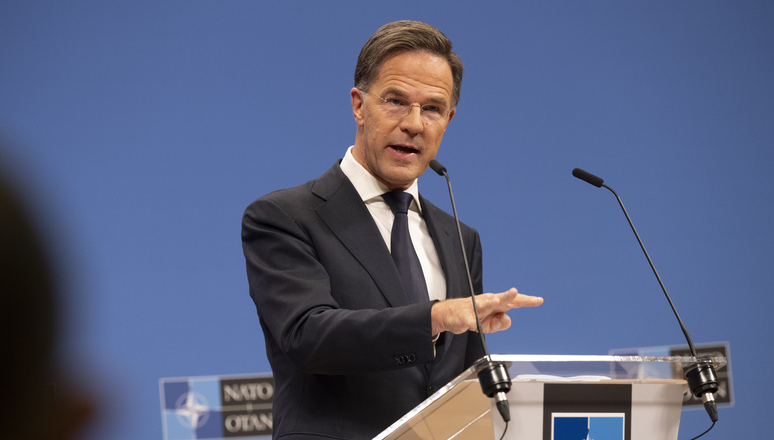
NATO’s Rutte concerned about Bosnia and Herzegovina and Kosovo
Kossev
NATO Secretary General Mark Rutte expressed concern over the situation in Bosnia and Herzegovina and Kosovo. Speaking in the European Parliament, the NATO Secretary General stressed the need to avoid a security vacuum in Bosnia and reaffirmed support for the ALTHEA mission. He pledged also continued NATO engagement to address potential challenges. Regarding Kosovo, Rutte confirmed ongoing contact with Pristina and Belgrade, particularly amid the election period, to prevent tensions. Rutte emphasised the importance of ensuring the elections do not lead to destabilisation. Kosovo will hold political elections on 9 February.
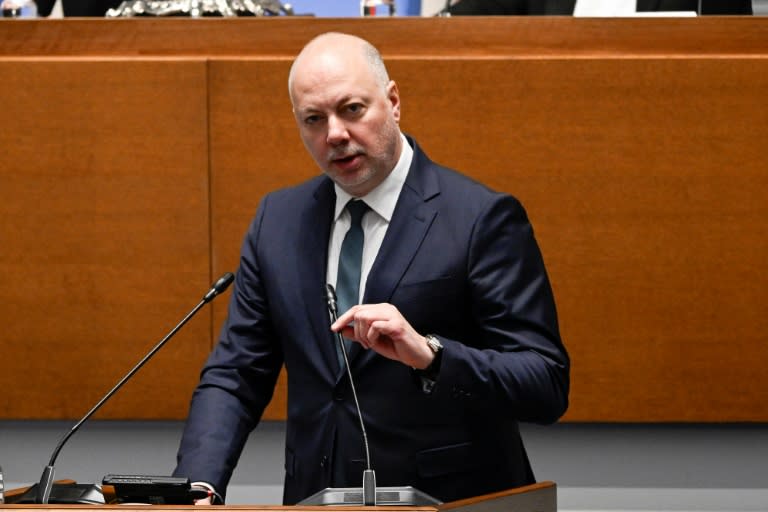
Long-lasting political crisis ends in Bulgaria
AFP
Bulgaria’s parliament approved a conservative coalition government, led by Prime Minister Rossen Jeliazkov, ending the country’s prolonged political crisis. Facing its worst turmoil since the fall of communism, Bulgaria had held seven snap elections since former PM Boyko Borisov resigned in 2021 after mass protests. Borisov’s GERB party, which won the last October election, managed to form a government with the Socialists and a populist party, with the executive backed also by a Turkish minority party.
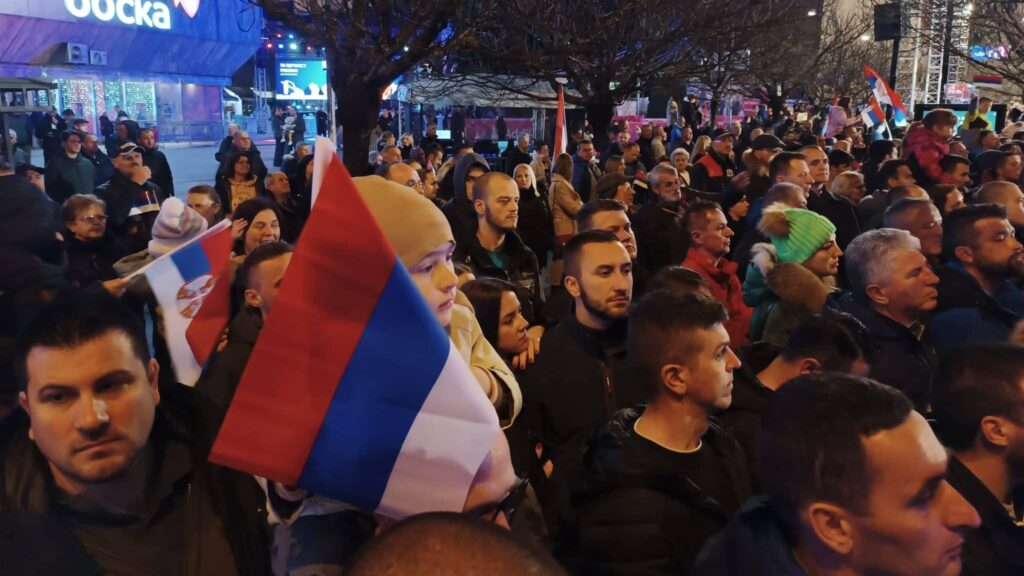
Bosnian Serbs celebrate illegal National holiday once again
Balkan Insight
Thousands participated in a parade marking the outlawed Day of Republika Srpska on 9 January, including bikers, veterans, civil servants, and armed police. Delegations from Serbia, Montenegro, and Russia joined locals in an event defying Bosnia’s Constitutional Court, which twice ruled the celebration unconstitutional for excluding other ethnic groups. The court clarified that the issue was not the holiday itself but the chosen date, which violated the principle of non-discrimination.
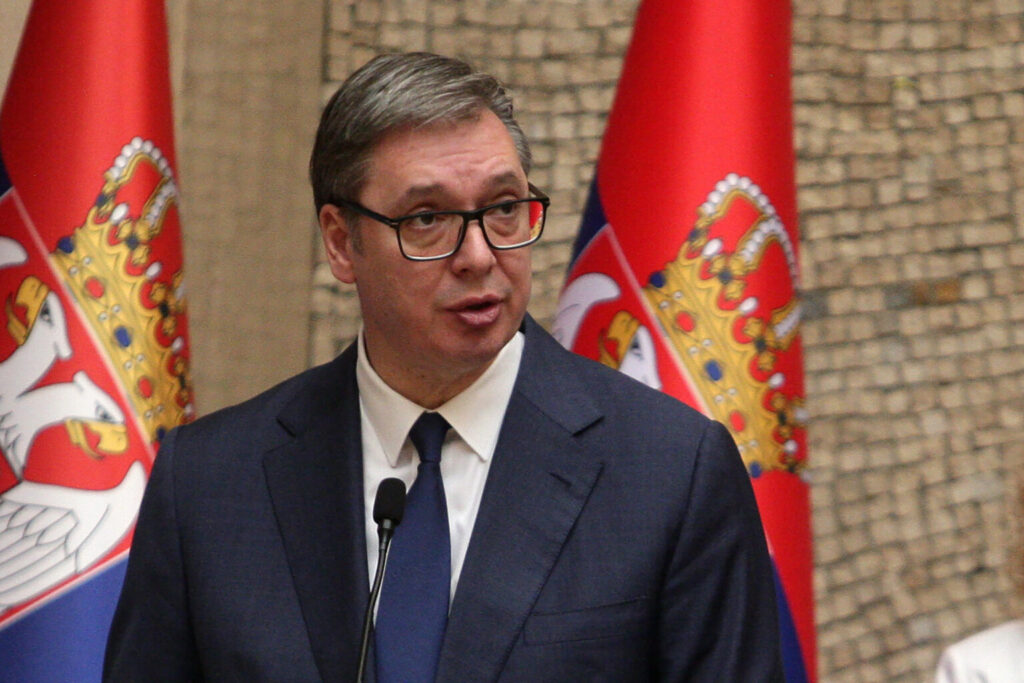
Vucic offers to Trump and Putin to meet in Belgrade
Telegraf
Serbian President Aleksandar Vucic expressed interest in hosting a potential meeting in Belgrade between the US and Russian presidents, according to pro-government media in Serbia reported. Speaking to TV Pink, Vucic stated that Serbia is ready to ensure security for both leaders and sees Belgrade as an ideal venue. The Serbian President claimed Serbia strongly supports Trump and Putin remains highly popular in the country. He also suggested sanctions on Gazprom Neft and its Serbian subsidiary could be lifted after Trump’s return to power.
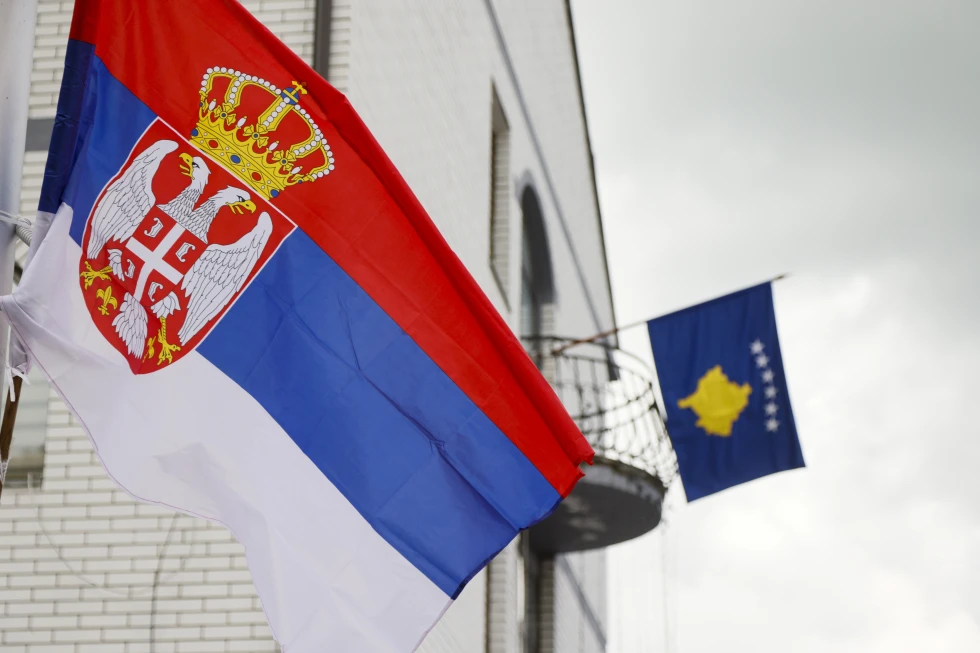
Kosovo closes more Serbian parallel institutions
Bloomberg
Kosovo’s government shut down over two dozen Serb-run institutions, including municipal offices and tax facilities in ten locations, weeks before the parliamentary election. Kosovo’s Interior Minister Xhelal Svecla defended the move as necessary to dismantle “criminal and illegal” structures. The closures, largely outside the Serb-majority north, triggered a strong response from Serbia. Petar Petkovic, head of the Serbian Office for Kosovo, accused Prime Minister Albin Kurti’s government of provoking tensions for political gain before the vote.
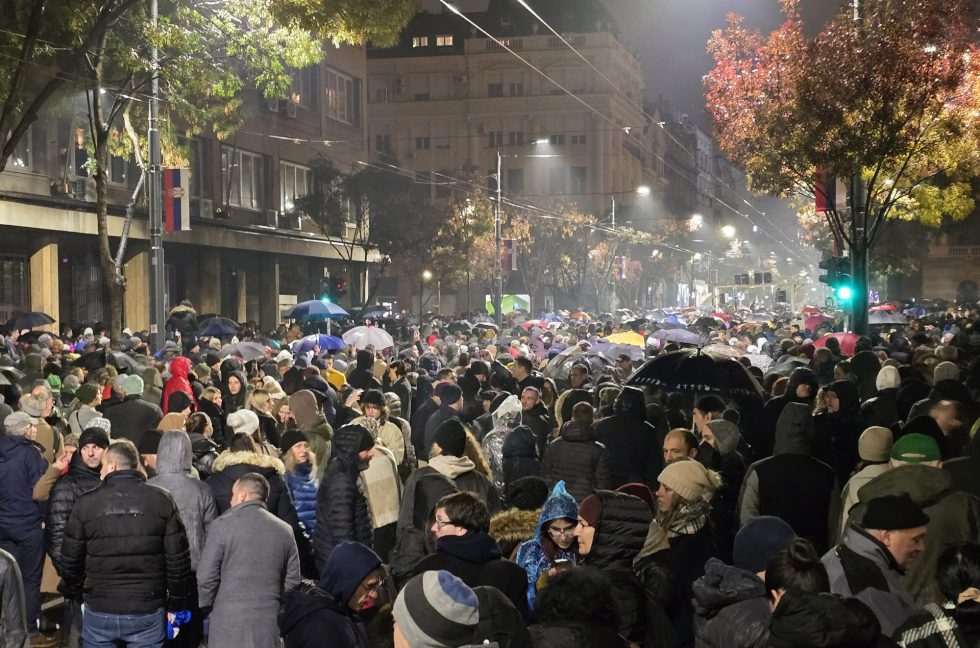
Serbia expels 13 NGO members, EU concerned
ENR
Serbian police expelled 13 members of NGOs from Croatia, Slovenia, Romania, Bosnia and Herzegovina, and North Macedonia after shortly detaining them in Belgrade. The 13 foreigners came to Belgrade to attend an NGO workshop organised by the Erste Foundation. All were banned from Serbia for a year. The European Commission expressed concern over the expulsion of peaceful civil society members, stressing the importance of civil society in a fully democratic society.
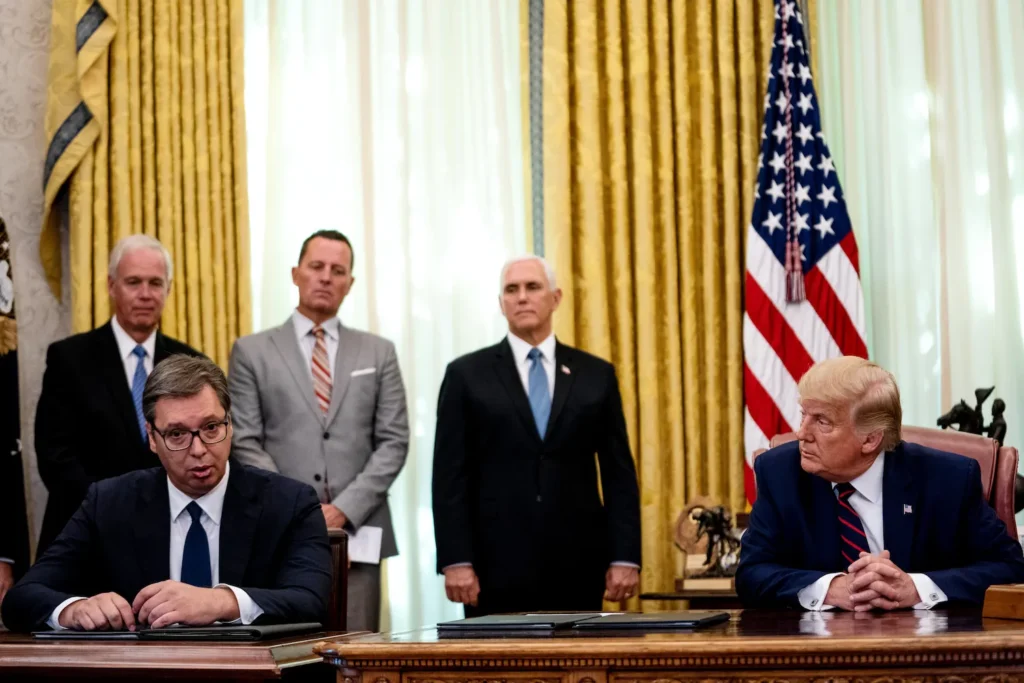
Foreign Policy analyses the potential Trump’s impact on the Balkans
FP
Foreign Policy warned in an op-ed that shifts in US foreign policy could disrupt the fragile status quo in the Western Balkans. Serb nationalists are particularly hopeful about Donald Trump’s return, expecting his administration to strengthen ties with Belgrade and Republika Srpska, potentially reshaping the region’s geopolitical balance in the coming years. However, while many fear a tilt toward Serb nationalists, the new administration’s transactional approach could also bring surprises.
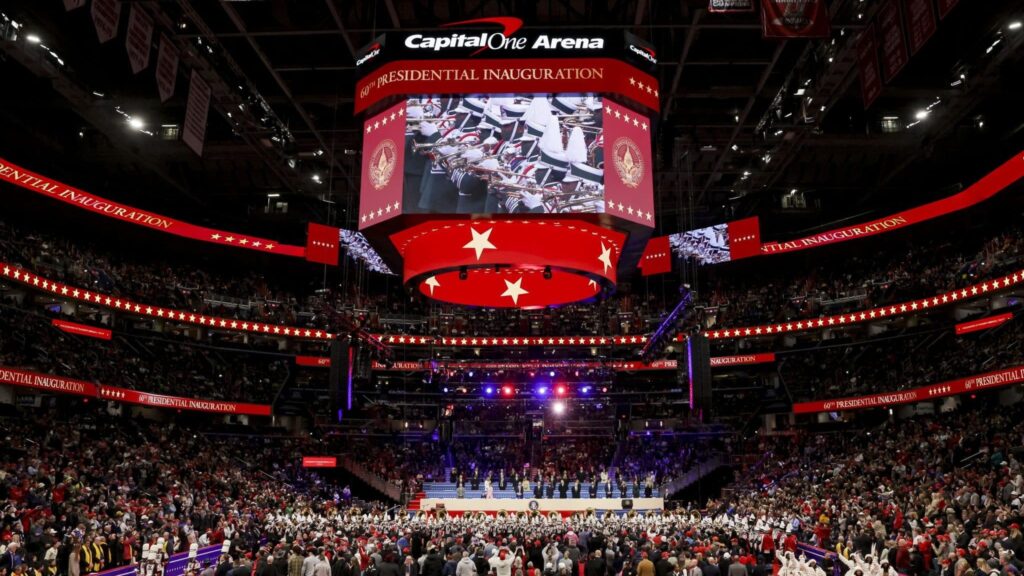
Politicians from the Balkans pay homage to Trump in Washington
Balkan Insight
A convoy of Balkan politicians travelled to Washington for Donald Trump’s inauguration, with some boasting invitations and others attending to show support. Alongside official state delegates, former ministers, party leaders, and right-wing Trump supporters used the event to network with US politicians and the new administration. Notable attendees included Albania’s Lulzim Basha, Kosovo’s ambassador Ilir Dugolli, former Kosovo PM Ramush Haradinaj, Bulgaria’s ex-PM Kiril Petkov, and Serbia’s ex-Economy Minister Rade Basta.
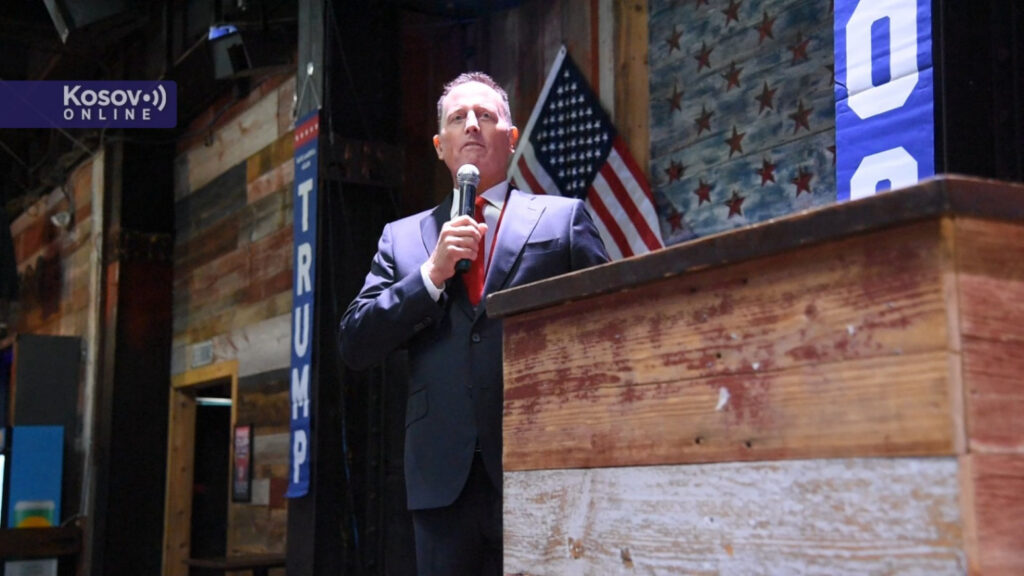
New Trump’s Envoy expresses support for Vucic’s Serbia
Kosovo Online
German Chancellor Olaf Scholz emphasised the need to expand lithium mining in Europe, citing its vital role in the transition to electric vehicles. During a visit to the Saxony Mining Authority, together with Serbian President Vucic, both leaders also discussed sustainable lithium extraction in Serbia. While the EU reached a lithium-related agreement with Belgrade in July, protests have erupted in Serbia over concerns about groundwater contamination and environment protection. Scholz acknowledged these concerns, stressing the importance of high environmental standards.

Belgrade cancels contract for military supplies with Russia
Euractiv
Serbia has cancelled contracts for Russian weapons and military supplies that have equipped its army since Soviet times, though Chief of General Staff Milan Mojsilovic did not clarify whether the country was completely severing ties with Russia. Serbia, a long-time ally of Russia, faces pressure to align its foreign policy with the EU following the invasion of Ukraine. Mojsilovic cited Western sanctions against Moscow as the reason for the cancellation, but noted Serbia would continue purchasing spare parts for Soviet and Russian equipment. Additionally, last year Serbia abandoned plans to buy Russian fighter jets, opting instead for French Rafale jets.
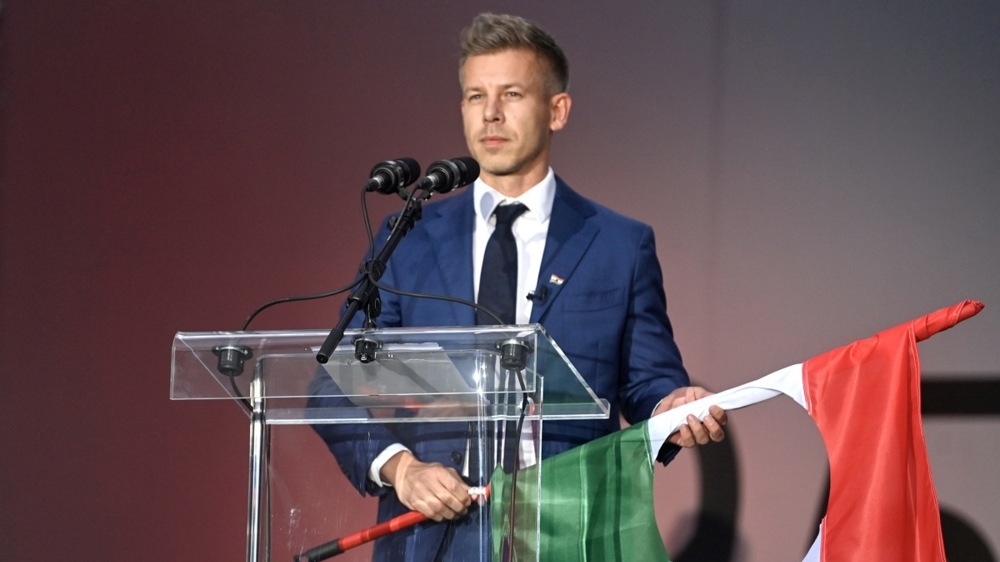
Orban’s challenger promises focus on EU and NATO
Euractiv-Reuters
Péter Magyar, the opposition challenger to Prime Minister Viktor Orban, stated in an interview that if he wins the 2026 elections, or early elections this year, he would ensure Hungary remains firmly in the European Union and NATO while seeking “pragmatic relations” with Russia. Magyar’s centre-right Tisza Party, which entered Hungarian politics last year, has emerged as a strong contender of Orban, mounting the most serious challenge to the populist Prime Minister, in power since 2010. Magyar’s popularity has been rising, with recent polls showing Tisza leading Orban’s Fidesz party.
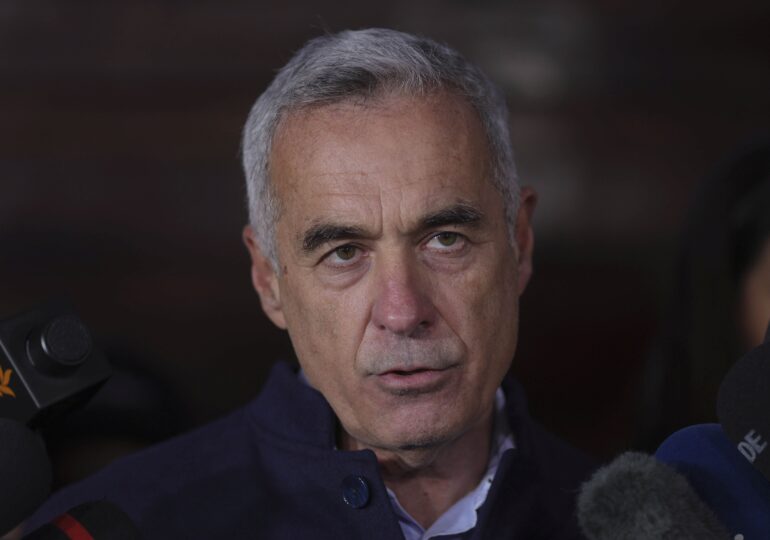
Biggest right Romanian party to back Georgescu at presidential elections
News.ro
The Alliance for the Union of Romanians (AUR), the largest right-wing party in Romania, announced its support for Calin Georgescu in the May presidential elections. Georgescu, the far-right candidate who led the first round of the annulled December election, remains the frontrunner in opinion polls regarding the rescheduled vote.
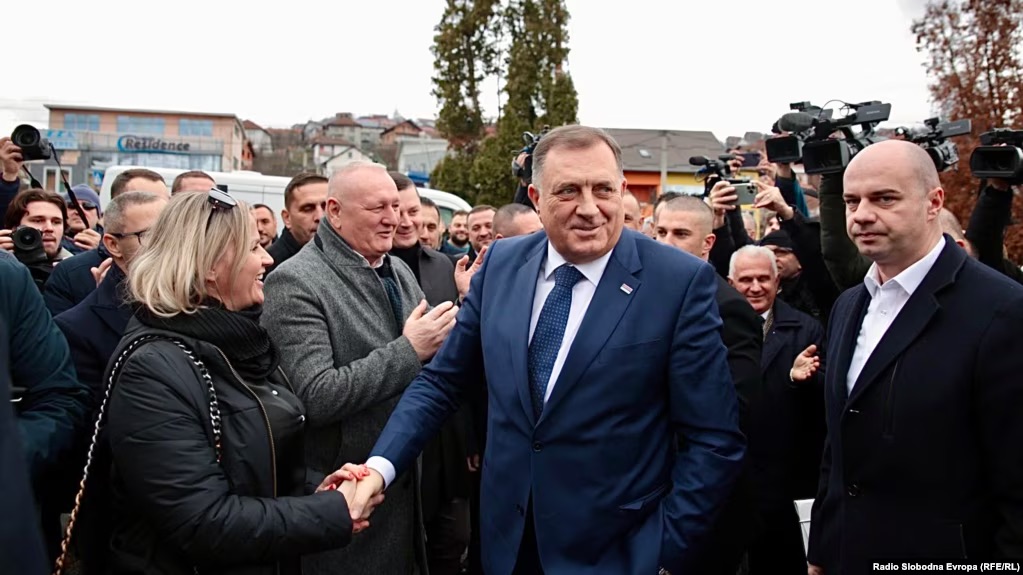
Trial against Milorad Dodik continues
Sarajevo Times
The trial of Republika Srpska President Milorad Dodik and Official Gazette director Milos Lukic for failing to implement High Representative Christian Schmidt’s decisions continued at the Court of Bosnia and Herzegovina. Postponed due to Dodik’s surgery in Belgrade on 9 December, it was rescheduled for 30 December after doctors deemed him unfit for hearings. Dodik’s defence requested a retrial, citing a 30-day deadline since the last session, which requires consent for evidence to be reintroduced.
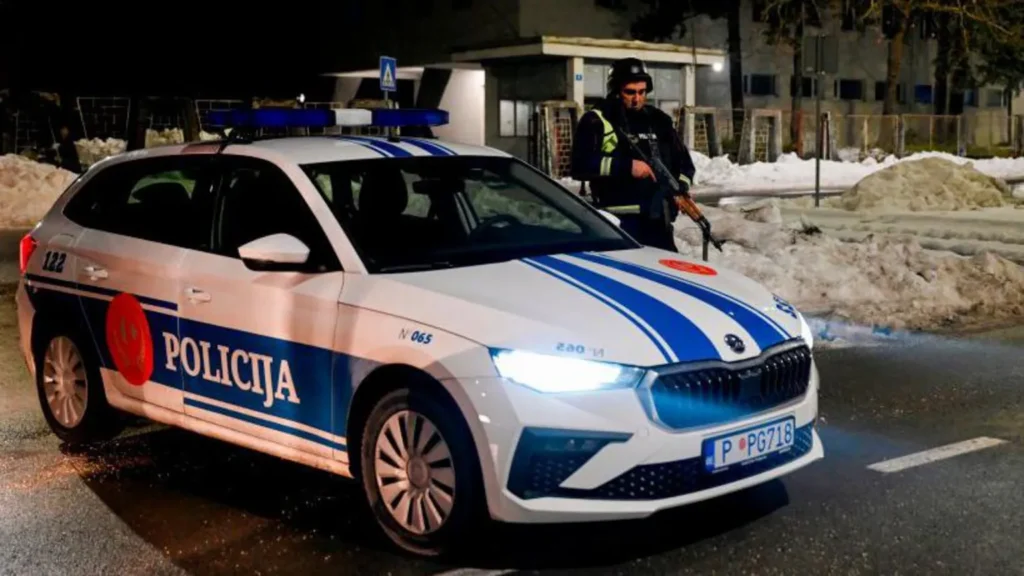
Twelve killed in mass shooting in Montenegro
BBC
A gunman killed 12 people, including two children, in southern Montenegro on New Year’s Day. Authorities reported that the man had been drinking heavily before a heated argument with another guest at a restaurant in Cetinje. After the altercation, he retrieved a weapon, returned to the restaurant, and began shooting several customers. He then drove to five other locations, killing more people, including family members. The victims included the restaurant owner and his children, aged 10 and 13. Similar mass shootings occurred in Montenegro in 2022 and in Serbia in 2023.
The Insight Angle

Jasmine Mujanovic
Jasmin Mujanovic is a political scientist and among the most influential analysts in the Balkans. He holds a PhD in Southeast European & Global Affairs and is a Senior Non-Resident Fellow at the New Lines Institute for Strategy and Policy in Washington, DC. He is the author of “Hunger & Fury: The Crisis of Democracy in the Balkans” and “The Bosniaks: Nationhood After Genocide” (2023)
In Bosnia and Herzegovina, the Bosnian Serb leadership once again celebrated the unconstitutional “National Day” of Republika Srpska, while Milorad Dodik reiterated his threats of secession. Do you believe Dodik could escalate his threats, plunging the country into a renewed crisis? Furthermore, what actions could the international community take to finally stabilise Bosnia and Herzegovina?
The threat of secession by the RS entity presently is less acute than it has been in years prior. That is for two reasons. First, the Dodik regime – and Dodik himself – are weaker than they have ever been. He is in very poor health and has already made visible succession plans, i.e. pushing his son, Igor, to take a more prominent role in the SNSD party. Economically, the entity is in dire straits and taking on additional borrowing just to service its existing debts. Moreover, the long-delayed enforcement of US sanctions vs. Dodik and other members of his regime in the first quarter of 2024 has resulted in the closure of several regime-affiliated firms, and many officials are now being paid in cash to circumvent the US measures. The latter may eventually result in a liquidity crisis in the entity which would further hasten Dodik’s fall.
Secondly, authorities in Sarajevo and the Federation entity have taken concrete steps to demonstrate their capacities to counter any moves towards secession by the Banja Luka regime. Both the Tuzla and Sarajevo cantons are in the process of procuring significant numbers of Canadian-made Roshel Senator armoured cars, and the country’s Defence Minister has also signalled that the Armed Forces have the capabilities to deal with any such putsch attempt, despite the likelihood of defection by Serb cadres of the military. Most importantly, the Federation-based munitions industry is realizing historic returns, producing large quantities of small and large arm munitions, including strategically critical 155 mm shells.
The outstanding question remains how Dodik will respond to his impeding verdict at the Court of BiH, where he is expected to be found guilty, and which would likely result in his legal ouster from office. If he fails to abide by the court’s rulings, which is also likely, then we will have a significant political crisis in BiH to contend with in the coming months.
The new European Commission has promised to accelerate the accession process for the Western Balkans. Do you see hope that the new leadership in Brussels could genuinely speed up integration? If not, what are the potential security risks and stability challenges the region might face?
I do not expect any meaningful progress for BiH or the region in terms of their EU prospects in the foreseeable future.
The EU and its member states, evidently, have neither the interest nor capacity to deal with the situation in the region, beyond purely symbolic or declarative flourishes. The EU is not even in a position to impose sanctions on Milorad Dodik. This lack of credibility by the EU will only further incentivise local actors to both look to themselves and other outside partners to shore of their respective interests. The EU will, as to date, complain about the results of such decisions but do nothing to challenge them.
Montenegro and Albania are reportedly the only candidate countries with a realistic chance of joining the EU, by or around 2030. Do you consider this goal achievable? What about the other states in the region? Could Serbia, Kosovo, North Macedonia, and Bosnia and Herzegovina also accelerate their accession paths, or is this merely a wishful thinking?
I do not think any of these countries, including Albania and Montenegro, will be joining the EU by 2030, so the entire conversation about enlargement is not merely wishful thinking, it has become quite irresponsible. EU membership is not on the docket. The question is: what is? For BiH, for instance, what is quite plausible is NATO membership. BiH could join NATO by 2030, and certainly by 2035. That is where the analytical and political focus should be.
Regarding the Serbia-Kosovo dialogue, how should the EU adjust its approach to compel Belgrade and Pristina to finally reach a normalization agreement?
We should not be seeking normalization, to begin with. It is evident that the appetite for normalization with Pristina does not exist in Belgrade. Just as Serbia does not actually respect BiH’s sovereignty or territorial integrity, or Montenegro’s for that matter. In short, the Vucic regime is the primary, if not solitary, generator of crisis in the region. Accordingly, the EU and its key capitals should focus on mitigating the possibilities for conflict and chaos available to Belgrade.
First, the five non-recognizers within the EU should be compelled to drop their irrational and irresponsible postures. They should immediately recognize Kosovo’s sovereignty and clear the path to the formalization of its relationship with the EU, sending the message to Vucic that the EU will not be beholden to his regime’s intransigence.
Secondly, immediate measures should be undertaken to secure Kosovo’s seat in the Council of Europe. Pristina has been unjustly denied a seat in the relevant European and international fora, further exacerbating Serbia’s maximalist agenda, and the same must be summarily checked.
Finally, like the EU, NATO should rapidly move towards the formal establishment of a legal-political relationship with Kosovo and provide a credible and realistic timeline for the country’s accession to the bloc, regardless of the status of its relationship with Serbia.
Lastly, what should we expect from the new Trump administration? Do you anticipate that the new US president will have any significant impact on the Western Balkans? If so, how?
Trump is, if nothing else, unpredictable. I do not anticipate, and sincerely hope, he will have no significant interest in the Western Balkans, not least because of his (in)direct financial links to the Vucic regime to through his son-in-law, daughter, and close associate Richard Grenell.
If he does in some fashion turn to the region, it will, as in his first term, likely be focused on Kosovo and Serbia, where we can expect Grenell to resume his feud with Kosovo’s PM Kurti. I do not anticipate that anything of substance will be accomplished, in any case, but Trump certainly has to ability to significantly upend the region’s security, depending on how aggressively he commits himself to Belgrade’s service.
Unfortunately, the Biden administration already went far down that road, indeed, and it is difficult to imagine any US official being more subservient to Vucic than US Ambassador Chris Hill has been, for instance, but I’m sure the Trump team will find a way, if they have the will to do so.
The Key Story
Strategic trends
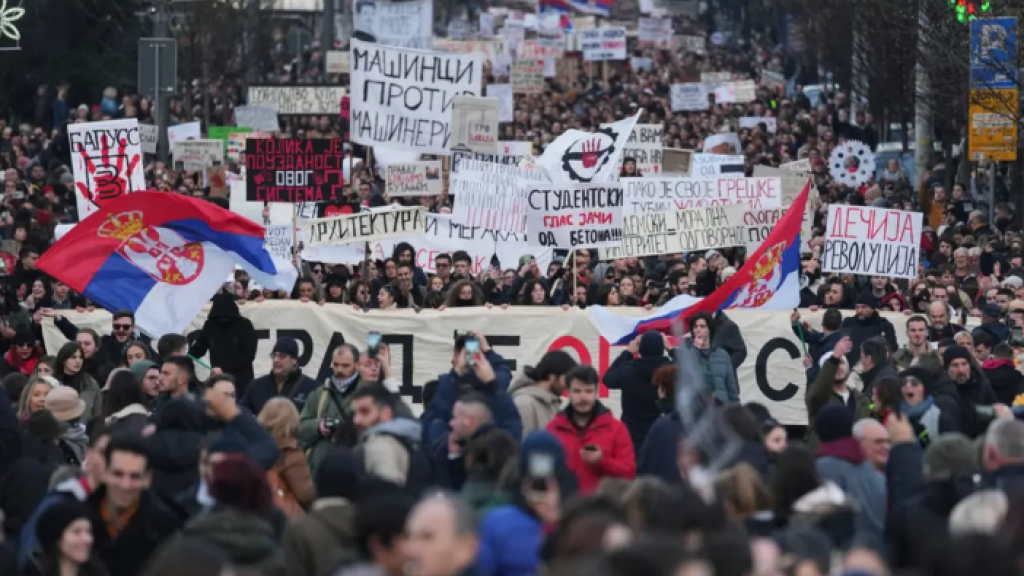
Mass protests in Serbia spark political crisis in Belgrade
After months of street demonstrations, marked also by incidents of violence against students, the massive wave of protests that has shaken Serbia since November 2024 culminated in a major political crisis in Belgrade in January. This has raised fears of potential destabilisation in this key Balkan nation, while also offering hope for a more democratic transformation in Serbia.
The ongoing protests in Serbia were sparked by the tragic accident at the recently reopened Novi Sad railway station, following a lengthy modernisation. On 1 November, the station’s external roof suddenly collapsed, killing 15 people. The incident fuelled long-standing anger across part of the Serbian public opinion over corruption and the alleged lack of oversight in construction projects. Over time, the protests became more and more massive, dominated by young people and students, with hundreds of universities and high schools occupied and daily demonstrations organised not only in Belgrade and Novi Sad, but across the entire country.
Since December 2024, students from more than 90% of Serbia’s state universities have blocked their institutions. The protesters claim that their primary goal is to restore “the rule of law and institutions that operate impartially, legally, and in the public interest.” “Supporting students is not just about backing their demand, it is about defending the right to a safe life in a society where institutions serve all citizens responsibly and transparently”, the student movement stated. The students have four main demands. They are calling for the publication of the complete documentation on the railway station reconstruction, the dismissal of criminal charges against detained or arrested students and citizens, the prosecution of those who attacked students and professors during the protests, and a 20% increase in budget allocations for education.
However, the protests also carry a strong anti-government and anti-Vucic sentiment, driven by a demand for a complete transformation in the way the country is governed. A CRTA think tank’s survey found significant hope among students but growing concern about the country’s direction, with anger and fear following the Novi Sad tragedy. It revealed that 61% of Serbians supported the protests and blockades after the canopy collapse, including 10% of ruling SNS party supporters.
The protests initially led President Aleksandar Vucic to accuse students of being manipulated by foreign influences, before later claiming to be open to dialogue. In a national address on 27 January, Vucic insisted that all the students’ demands had been met but simultaneously called for a government reshuffle.
Vucic’s gesture was quickly overshadowed by a brutal attack in Novi Sad, registered just hours after his speech. A group of young individuals, some linked to the ruling Progressive Party of Vucic and of Prime Minister Milos Vucevic, assaulted a group of students, severely injuring a young woman. The incident sparked outrage among students and people nationwide.
Then, on 28 January, the political crisis escalated further. Following months of protests and the latest act of violence against students in Novi Sad, Serbian Prime Minister Milos Vucevic announced his resignation, along with the mayor of Novi Sad. Vucevic was in power for less than a year. “My decision to resign is irrevocable,” Vucevic stated, emphasizing that his resignation was intended to prevent “further complications and avoid escalating tensions in society.” Afterward, Vucic addressed the nation on television, defending the authorities’ response to the Novi Sad tragedy and vowing again to engage in dialogue with the protesters. The Serbian leader also stated that he would soon decide whether the solution to the political crisis would be a new government backed by the Progressive Party or early elections, possibly to be held in April.
The resignation of Prime Minister Vucevic and the calls for dialogue from Vucic, however, are unlikely to quell the protests. The student movement continues to organize demonstrations, while opposition parties have stated that early elections are unacceptable unless fair conditions, including media freedom, are ensured in the country.
Serbia, in any case, seems to be heading toward a prolonged period of instability or even towards an escalation of the protests that could possibly lead to a regime change. Mass protests across the country have exposed severe cracks in Vucic’s decade-long rule, and his grip on power seems to weaken each passing day. And while the EU keeps silent, Moscow, an ally of Vucic’s Serbia, warned against the prospect of “chaos” in the country following months of protests.
Further News and Views
Current Croatian populist President Milanovic wins re-election bid
Sources: CNN, Al Jazeera, Balkan Insight
Croatia’s opposition-backed President, Zoran Milanovic, secured a resounding victory in his re-election bid, defeating Dragan Primorac, the candidate from the ruling conservative party, the Croatian Democratic Union (HDZ), after a runoff vote.
Former left-wing Prime Minister and current President Milanovic received over 74% of the vote, while Primorac garnered only 26%, according to official results from Croatia’s state election authorities. The result marked a significant win for Milanovic, who has opposed Western military support for Ukraine in its conflict with Russia. Milanovic’s victory is largely due to his personal popularity, winning the trust of both left-wing party supporters and a segment of right-wing voters, whom he attracted with nationalist and sovereigntist rhetoric, expert and analyst said.
Milanovic is considered one of the most popular politician in Croatia, known for his combative and populistic communication style, often compared to that of US President Donald Trump. The Croatian President campaigned on criticism of the conservative government, particularly targeting Prime Minister Andrej Plenkovic.
His victory should be read as a blow to the ruling HDZ, which had won both the parliamentary and European Parliament elections the previous year. Milanovic’s second presidency is expected to lead to ongoing conflicts with the right-wing government, potentially undermining the coherence of Croatia’s foreign policy, particularly as Milanovic is sceptical about providing further aid to Ukraine.
US sanctions hit Russian-Serbian energy giant
Sources: Euractiv, CEE Energy News, Tanjug, SeeNews
The United States imposed sanctions on the Serbian Petroleum Company NIS, Belgrade’s energy giant, due to its majority Russian ownership. Russia’s Gazprom owns over 50% of the company. The US Department of the Treasury’s Office of Foreign Assets Control (OFAC) added NIS to its sanctions list alongside Gazprom Neft and Russia at the beginning of January.
The US demands that Serbia fully remove Russian capital from NIS, setting a 45-day deadline, expiring on 25 February. Gazprom Neft holds 50% of NIS, while Gazprom owns 6,15%, and the Serbian state holds around 30%. The sanctions are set to take full effect in 45 days, during which Serbia is expected to take steps to disinvest while ensuring its oil supply security.
To avoid sanctions, Serbia must eliminate Russian ownership in its National Oil Company (NOCS), the country’s largest energy firm, said the US Assistant Secretary of State James O’Brien, confirming that Serbia faces severe sanctions if it does not comply. Serbian President Aleksandar Vucic said that a transformation plan must begin immediately, with all operations to be completed by 25 February, and the financial transaction potentially extending until 12 March. He also anticipated he will hold talks with Putin and the new U.S. administration.
Meanwhile, Croatian oil pipeline operator Janaf, which supplies most of NIS’s oil via the Janaf pipeline, sought approval from OFAC to continue to respects the contract with NIS.
EU - NATO
Massive NATO exercise in the Balkans
Sources: Greek Reporter, BBC, NATO
Preparations for a large-scale NATO exercise, the so-called Steadfast Dart 25 (STDT25), began in January across Greece, Romania, and Bulgaria, involving at least 10.000 military personnel. Nine NATO member countries are participating in the STDT25 exercise, designed to assess the readiness and rapid deployment capabilities of NATO forces along its Eastern flank. This marks also the first major deployment of the Allied Reaction Force (ARF), established in 2024.
The STDT25 involves air, land, naval, and special operations forces, with 17 ships, more than 20 aircraft and helicopters, including EF-2000, F-16, AV-8B Harrier fighters, and A-400 transport aircraft. Over 1.500 pieces of military equipment are also part of the exercise, such as tanks, multiple launch rocket systems, self-propelled artillery, infantry fighting vehicles, and armoured personnel carriers.
The exercise, running across Romania and Bulgaria for the next two months, coincides with the three-year anniversary of Russia’s invasion of Ukraine.
ECONOMICS
Bosnia and Herzegovina to receive Western gas
Sources: Forbes, Energy News, Pipeline Technology Journal
In an important strategic development, Bosnia and Herzegovina moved towards constructing the ‘Southern Interconnection’ natural gas pipeline, a project aimed at enhancing energy security and reducing reliance on Russian supplies.
The initiative’s main goal is to diversify gas routes and sources of gas to the Balkan country by importing American liquefied natural gas (LNG) from the terminal on Croatia’s Krk Island. It has also the goal of permitting Bosnia to access sources of gas from the Caspian region.
If completed, it would create the first gas pipeline interconnector between Bosnia and Croatia, with a capacity of 1,5 billion cubic metres. On 16 January, a law that removed a major legislative obstacle after over 15 years of political deadlock was passed, paving the way to the realization of the pipeline. Strongly supported by Washington, the project aims to massively reduce Bosnia’s dependence on Russian gas and Moscow’s influence in the region.

Stefano Giantin
Journalist based in the Balkans since 2005, he covers Central- and Eastern Europe for a wide range of media outlets, including the Italian national news agency ANSA, and the dailies La Stampa and Il Piccolo.

